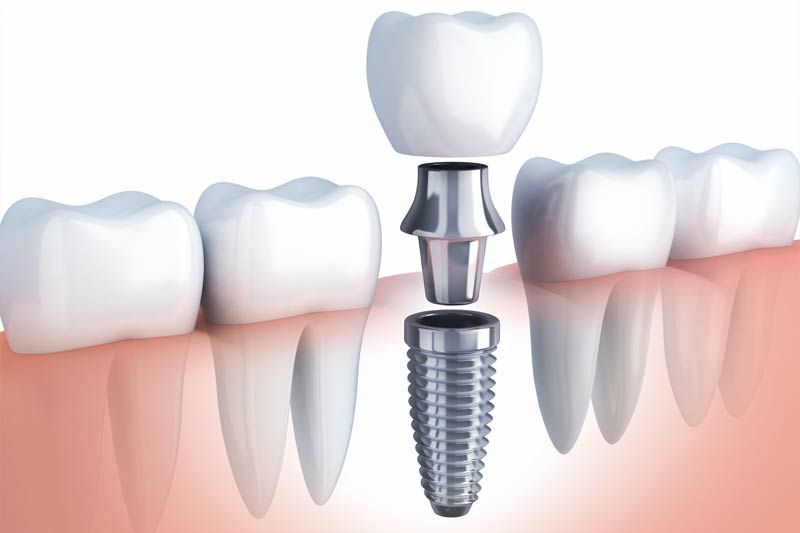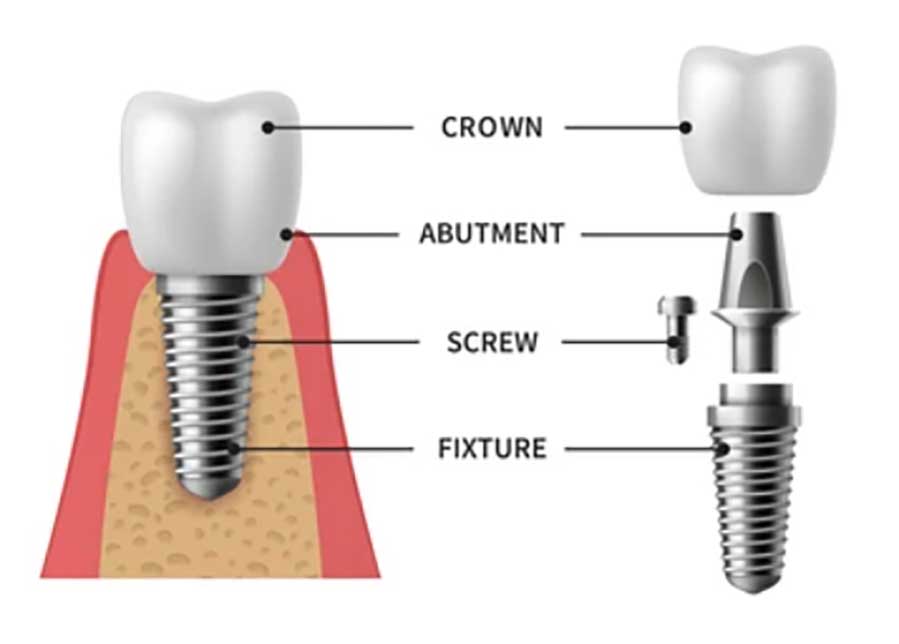Pediatric Dentist Hartford OH Dental Implant Recovery
Pediatric Dentist Hartford OH Dental Implant Recovery
Blog Article
Dental Care Condit OH Dental Implants: Options, Costs, and Care
Dental implants have emerged as a preferred alternative for individuals in search of a long-term solution to tooth loss. One essential facet of understanding dental implants includes their effect on adjacent teeth. This is particularly essential for guaranteeing the health and longevity of the complete dental structure.
When a dental implant is placed, it mimics the operate of a natural tooth root. By doing so, it helps maintain the integrity of the encircling bone structure. Natural teeth depend on a balanced, interconnected system for support, and dental implants can contribute positively to that dynamic. The stability provided by the implant allows for higher distribution of bite forces, which might prevent undue stress on adjacent teeth.
Orthodontics Centerburg OH Full Mouth Dental Implants: A Comprehensive Solution
In instances where a tooth is missing, the neighboring teeth could shift into the vacant space. This shifting can result in misalignment and numerous different complications. By placing a dental implant, the danger of this shifting is decreased, as the implant acts as a placeholder that preserves the natural alignment of surrounding teeth. This preventive impact is essential for long-term oral health and function.
Another necessary consideration is bone loss. When a tooth is lost, the jawbone within the space can begin to deteriorate due to a scarcity of stimulation. Dental implants assist prevent this bone loss by offering the required stimulation to the jawbone, very like a natural tooth root would. This preservation of bone not only supports the implant itself but in addition contributes to the stability of adjacent teeth.
The type of material used in dental implants, typically titanium, has a singular property of osseointegration, which means it fuses with the bone over time. This integration offers a sturdy basis for the artificial tooth while guaranteeing that the implant doesn’t negatively affect surrounding constructions. As the implant integrates, it creates an setting that contributes positively to the health of the adjacent teeth.

Regular dental check-ups play a vital function in monitoring the impression of dental implants on adjacent teeth. Professional assessments may help determine any issues that may come up, guaranteeing prompt therapy and maintaining the health of the whole dental arch. These evaluations would possibly embrace X-rays to check for bone density and the overall condition of the implant and surrounding teeth.
Mono Implants Hartford OH Permanent Dental Implants
Oral hygiene practices are vital for individuals with dental implants. Proper brushing and flossing habits not only contribute to the longevity of the implant but in addition ensure that adjacent teeth remain wholesome. Food particles and plaque that accumulate across the implant may cause problems, including peri-implantitis, an inflammatory condition that may have an result on surrounding teeth and tissues.
The positioning of dental implants can influence the health of adjacent teeth. If an implant is placed at an angle or not correctly aligned, it could lead to increased stress on neighboring teeth. This misalignment may cause put on and tear on adjacent enamel, probably leading to cavities or other dental points. Therefore, the skill and experience of the dentist performing the implant process are paramount in achieving a successful consequence.
In some situations, extra procedures may be necessary to organize the encompassing space for an implant. Bone grafting or sinus lifts may help create a better surroundings for the implant. While these procedures are aimed at enhancing the location for the implant, they also serve to guard the health of adjacent teeth by creating a more steady basis.
Premier Dental Condit OH The Advantages, Risks, and Insurance for Dental Implants

As dental technology evolves, developments in implant techniques lead to better outcomes. Improved imaging methods and computer-aided design enable for extra exact placements that decrease risk to adjacent teeth. With these advancements, the likelihood of issues that might come up from improperly positioned implants diminishes considerably.
Post-operative care additionally performs a critical function in making certain that adjacent teeth stay unaffected. Patients must adhere to the dentist's instructions relating to food regimen, oral hygiene, and follow-up visits. Neglecting these pointers might result in issues that impact not only the implant but additionally the neighboring teeth.
Mono Dental Implants Galena OH Dental Implants for Seniors: Considerations and Benefits
In conclusion, dental implants, when positioned accurately and cared for correctly, have the potential to reinforce the health of adjacent teeth rather than detract from it. They keep alignment, stimulate bone development, and provide a secure basis that helps the entire dental structure. Understanding how dental implants have an effect on adjacent teeth emphasizes their significance as a long-term tooth replacement solution. With steady developments in expertise and methods, the mixing of dental implants into restorative dentistry is becoming more and more successful, ensuring healthy and practical smiles for years to return.

- Dental implants prevent adjacent teeth from shifting into the gap created by a missing tooth, helping to maintain correct alignment in the mouth.
- The rebuilding of the jawbone via an implant can stimulate surrounding teeth and maintain them healthy by offering needed bone density that might otherwise diminish.
- Adjacent teeth benefit from the stabilization that dental implants provide, decreasing the chance of damage and tear from misalignment throughout chewing.
- Implants can defend adjacent teeth by appearing as a framework, which might distribute chew forces evenly throughout the dental arch as a substitute of placing undue stress on neighboring teeth.
- When placed appropriately, dental implants minimize the chance of gum disease which can have an result on adjacent teeth by maintaining a clear and wholesome gum line.
- The presence of an implant can facilitate an improved oral hygiene routine, as it eliminates the necessity for bridgework that would entice food particles round adjacent teeth.
- Regular dental check-ups can reveal how well the implant integrates with surrounding constructions, ensuring ongoing health for adjacent teeth.
- Implants can prevent the natural process of bone resorption that occurs after tooth loss, positively impacting the soundness and longevity of adjacent teeth.
- The use of dental implants may scale back the need for more invasive procedures sooner or later, offering a long-term solution that maintains the structure of the whole dental arch.
- Successful integration of an implant into the dental arch enhances overall oral function, typically resulting in improved confidence and oral health for adjacent teeth.undefinedHow do dental implants affect adjacent teeth?
What impact do dental implants have on the alignment of adjacent teeth?
Dental implants generally prevent the shifting of adjacent teeth, serving to to maintain proper alignment. This stability can scale back the danger of growing chew points over time.
Can dental implants cause injury to nearby teeth?
When placed accurately by a qualified professional, dental implants mustn't damage adjacent teeth - Johnstown Dental Pataskala OH. However, improper placement or insufficient planning could result in complications
Family Dental Clinic Galena OH Permanent Dental Implants
Do dental implants require any particular care concerning adjacent teeth?
Maintaining good oral hygiene is crucial. Surrounding teeth must be brushed and flossed frequently, and routine dental check-ups will help be sure that each the implants and adjacent teeth stay wholesome.

Will dental implants impact the health of Learn More Here my surrounding teeth?
Dental implants can enhance the health of surrounding teeth by distributing chew forces evenly, reducing put on and tear. Additionally, they will prevent bone loss in the jaw, which may affect adjacent teeth.
Johnstown Dental Columbus OH Full Mouth Dental Implants
Are there any long-term results of dental implants on close by teeth?
Long-term, dental implants may help preserve the health of adjacent teeth by preventing shifting and potential gum issues, ultimately contributing to better oral health total. - Dentist Johnstown OH
Can gum problems arise around adjacent teeth after getting implants?
If proper dental care is neglected, gum issues could develop round both the implants and adjacent teeth. Following post-operative care directions is crucial to reduce these risks.
Dental Center Centerburg OH Types of Dental Implants
How do dental implants evaluate to bridges when it comes to adjacent teeth?
Dental implants are typically useful as they don’t require alteration of adjacent teeth, in contrast to bridges, which necessitate reshaping of close by teeth for support. (Mono Dental Implants Granville OH)
Can I nonetheless get cavities learn the facts here now in adjacent teeth if I have dental implants?
Yes, adjacent teeth can still develop cavities if not correctly cared for. Dental implants themselves cannot get cavities, but they require vigilant hygiene practices to guard surrounding natural teeth.
What is the success rate of dental implants in useful reference relation to surrounding teeth?
The success rate of dental implants is high, but it largely is dependent upon the quality of the procedure and ongoing care. Well-maintained implants typically lead to better outcomes for adjacent teeth as well.